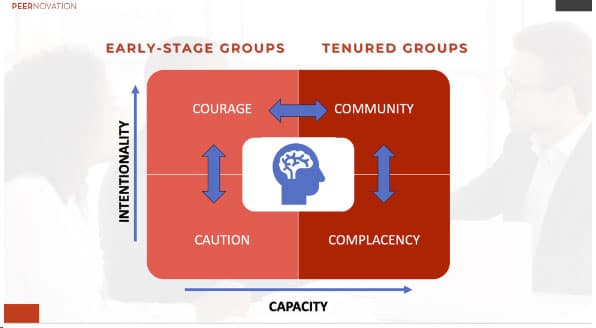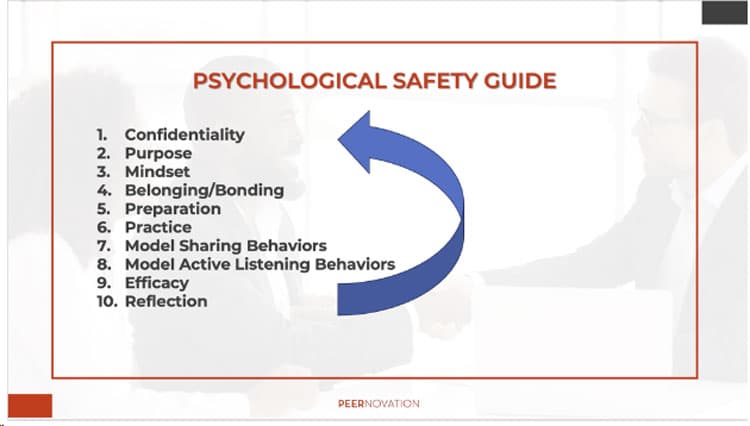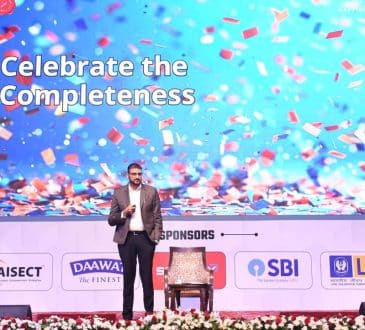Maximizing Psychological Safety Is Hard. CEO Forums Explain Why.

CEO Forums create a safe space for organizational leaders to be open and vulnerable with one another about their business and their lives. Rather than showcase their highlight reel (as everyone does on social media), they choose to be real – to talk about their struggles and aspirations, where confidentiality is held as sacrosanct. They strive to bring their best selves to each meeting in this regard because they know that if they do, it’s where the real value lies in their interaction. However, creating and maintaining a psychologically safe environment at the highest level, where the members play all in, is easier said than done and even harder to sustain.
The following 2×2 offers an illustration of why psychological safety is not an outcome to be achieved so much as a way of being that requires constant attention from everyone in the group. It also paints a picture of why it’s so challenging.

Early-stage groups are shown on the left, with more Tenured Forums on the right. The vertical axis depicts Intentionality. The horizontal line highlights the Capacity of a forum to leverage its psychological safety. The more intentional the members are when it comes to creating a psychologically safe environment and leveraging it to their personal best, the greater the capacity of the group to maximize this extraordinary environment – a brand of safe space that many people may never experience.
The lower left quadrant depicts early-stage group members. This collective tends to participate with caution. Even if they trust the environment to be safe, many of them still only stick their toes in the water. By nature or nurture, these people are inclined to keep their loftiest aspirations and greatest fears to themselves, at least at first. Others, who consider themselves an open book, may dive into the deep end of the pool without hesitation. Depending on the outcome, which is usually remarkably positive, it provides tacit permission to the others that the water is fine. Over time, more members will follow, testing and realizing the benefit of the group’s psychological safety for themselves.
In the upper-left quadrant, the group and the environment they are experiencing inspire a new level of openness and vulnerability that has grown since their initial gatherings. Their heightened level of intentionality to challenge themselves has helped more than half the members feel psychologically more courageous than they would naturally be inclined. In doing so, they realize greater value for themselves and see the positive impact it has on everyone else.
In the upper right quadrant (which is where you want to be), group members regard sharing as less courageous and more generous. They become a Community in which being vulnerable about business or personal challenges and aspirations evolve into part of who they are. While this appears to be a natural progression among high-performing individuals who, through their commitment to intentionality and to one another, can dramatically increase their capacity to lean into their psychologically safe space, it can also be challenging to sustain.
Turnover and Psychological Complacency
Change is inevitable. Ask any forum member, and they will tell you that psychological safety takes a hit when new members join the group. The more new members are introduced to the group, combined with others who may leave, the easier it can become to slip back to the courage or even caution quadrant. Take your eye off your level of intentionality in the face of this dynamic, and you won’t know what hit you.
This slippage is not just about adding new members; it can also involve change within the current members. Members who appreciate and relish sharing with the group can find themselves, over time, devolving into psychological Complacency. It’s like having a new swimming pool built in your back yard. You dove in headfirst every day when you first got it, until one day you found yourself dangling your feet in the water or sitting next to it and reading a magazine – hardly the way to leverage the pool’s restorative gifts. It’s time to start diving again.
Intentionality and Follow-through Builds Sustainable Capacity
Whether you’re a new member trying to step deeper into the pool or an experienced member who wants to enjoy diving again, this simple guide will get you on track.

Embrace confidentiality like you did your first born. Craft a one sentence purpose statement, and revisit it regularly to reconnect with your why and drive your mindset for success. Create a sense of belonging with new members, and never stop learning more about your longtime ones. Prepare for your group meetings; don’t just show up. The more prepared you are, the more psychologically safe you’ll feel and the better the example you set for others. Practice may not make perfect, but practicing at half-speed won’t help anyone. Show your fellow members what great sharing and listening behaviors look like. Acknowledge the results you and the group are experiencing when you all bring your best. Take some time to reflect on your performance and keep sharpening the saw.
Summary
Like many things in life, psychological safety is a living breathing organism. It’s not a “check off the box” or “we’ve got this” endeavor. Whether you are a new group that aspires to be great or a great group that believes you can be even better, it will require everyone in your community to bring their best every time they engage with one another.
If they do, anything is possible.
Written by Leo Bottary.
Have you read?
Best CEOs. Best Companies. Richest People (Billionaires). Richest Women (Billionaires). Richest in Each Country (Billionaires).
Bring the best of the CEOWORLD magazine's global journalism to audiences in the United States and around the world. - Add CEOWORLD magazine to your Google News feed.
Follow CEOWORLD magazine headlines on: Google News, LinkedIn, Twitter, and Facebook.
Copyright 2025 The CEOWORLD magazine. All rights reserved. This material (and any extract from it) must not be copied, redistributed or placed on any website, without CEOWORLD magazine' prior written consent. For media queries, please contact: info@ceoworld.biz








